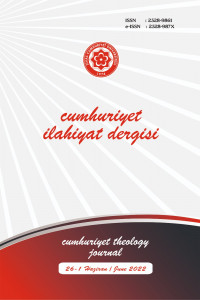Erken Rönesans Döneminde Panteistik Temalı Bir Tanrı Tasavvuru -Nicholas of Cusa’da Tanrı-Âlem İlişkisi
A Pantheistic Conception of God in Early Renaissance -The Relationship Between God and Universe in Nicholas of Cusa
Author(s): Fatih TopaloğluSubject(s): Metaphysics, Philosophy of Middle Ages, Philosophy of Science, Psychology of Religion
Published by: Cumhuriyet Üniversitesi İlahyat Fakültesi
Keywords: Philosophy of Religion; Nicholas of Cusa; God; Universe; Unity; Equality;
Summary/Abstract: This study is focused on the understanding of being, which would be considered original for Nicholas of Cusa's age, who is one of the important characters of the 15th century's philosophy, and on the concept of God comprising pantheistic themes. This concept harboring the fundamental effects of the Platonic philosophy tradition is reflected in the works of Cusa, which he created during his academic life and under Papa's protectorate, and affected the religious comprehension of his age. Considering his philosophic and theological ideas, Cusa played an important role in the differentiation of the scientific and philosophic approach, which was under the dominance of the Scholastic view. His conception of God can be considered as an effort to consider God, man and the universe from a shared perspective. In this perspective, there are three elements, which are conceived in divine unity. These three elements can be expressed as follows: God, as an absolute being and the active part in this relationship; the universe, as the place and space of the divine appearance, and Jesus, who makes the relationship between God-universe and man possible with his personality, which is the only one of its kind. The dialectical method, which gave the characteristics to the thoughts of Cusa, reveals itself clearly in his views about the Maximum (el Máximo) and Minimum (el Mínimo) concepts, which he used for the definition of God. These concepts, which are used to serve as an infrastructure for all intellectual efforts realized about God, are handled in a kind of unity in the sense of potential and formal comprehension of Maximum and Minimum. Cusa was for a middle way based on a absolving approach attributed to God for the explanation of his relationship with the universe. That is, Cusa, who views these attributes as necessary in terms of the reality of religious life, always gives a sense of the sensitivity of knowing the attributes as a limited activity that can only take place on the basis of created things. If affirmative names are to be attributed to God, they must be made in terms of His relationship to creatures. In Cusa's cosmology, the universe is understood as containing an infinite multitude of infinitely different motions, each revolving at its center and bound both by its relation to a common cause and by its participation in the universal order. Thus, Cusa based its cosmology on a metaphysical doctrine instead of physics and in this way adopted not a world-centered but a God-centered view of the universe. In this system, God is accepted as an essence penetrating the universe and virtually dispersing into it, and therefore, it is emphasized that there is no relationship of superiority between the elements comprising the universe because they get their origin and existence from a divine essence. On the other hand, the question of how everything can be understood as a manifestation of a single infinite Form, despite the existence of different levels of possibility, finds the answer in the fact that infinite Form can only be achieved finitely. In this respect, although the universe is limitless in one sense and infinite in its unique kind, it can be defined as neither finite nor infinite. Consequently, the universe is both finite and infinite, as it enters the field of being about the infinity of God, and thus to His infinity, which encapsulates the whole possibility of existence and does not hold this possibility in itself. In this way, each created one compromises a finite infinity or created divinity in respect of its existing status. In Cusa's philosophy, Jesus Christ has a very critical function in respect of the foundation of the system in a correct way. The ontological connection between God, who is the Absolute Maximum, and the universe, which is the Contracted Maximum is established through him. Spontaneously, the structure composed of the opposites, which are compromised by the Absolute Maximum and revealed in the universe, comes to the front as a principle of harmony and equality. Such a conceptualization of the being brings with it the idea of a need for a being, which compromises the past and the last without being tied to temporal processes and provides the order and stability of the universe that is not suitable for unity and simplicity by its nature. So, Jesus takes his place in this system as the medium of the relationship between God and the realm. In this article, we attempted to evaluate the ideas of Nicholas Cusa on the God-universe relationship based on the literature, which he created through his almost 25-year-long academic carrier, with a descriptive approach. The main objective of this study is our conviction that the comparisons made between different views developed in belief circles, which have to face particularly this problem about the Godrealm relation, which is one of the main topics of the theological thought system, may reveal meaningful outcomes about the nature of the religious thought and belief. Here we will attempt to trace this effect through the thought of Cusa, which brings a new interpretation to the philosophical tradition to which it adheres, with philosophical and mystical implications.
Journal: Cumhuriyet İlahiyat Dergisi
- Issue Year: 26/2022
- Issue No: 1
- Page Range: 235-250
- Page Count: 16
- Language: Turkish

